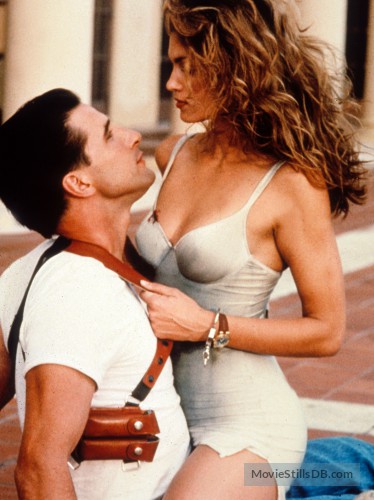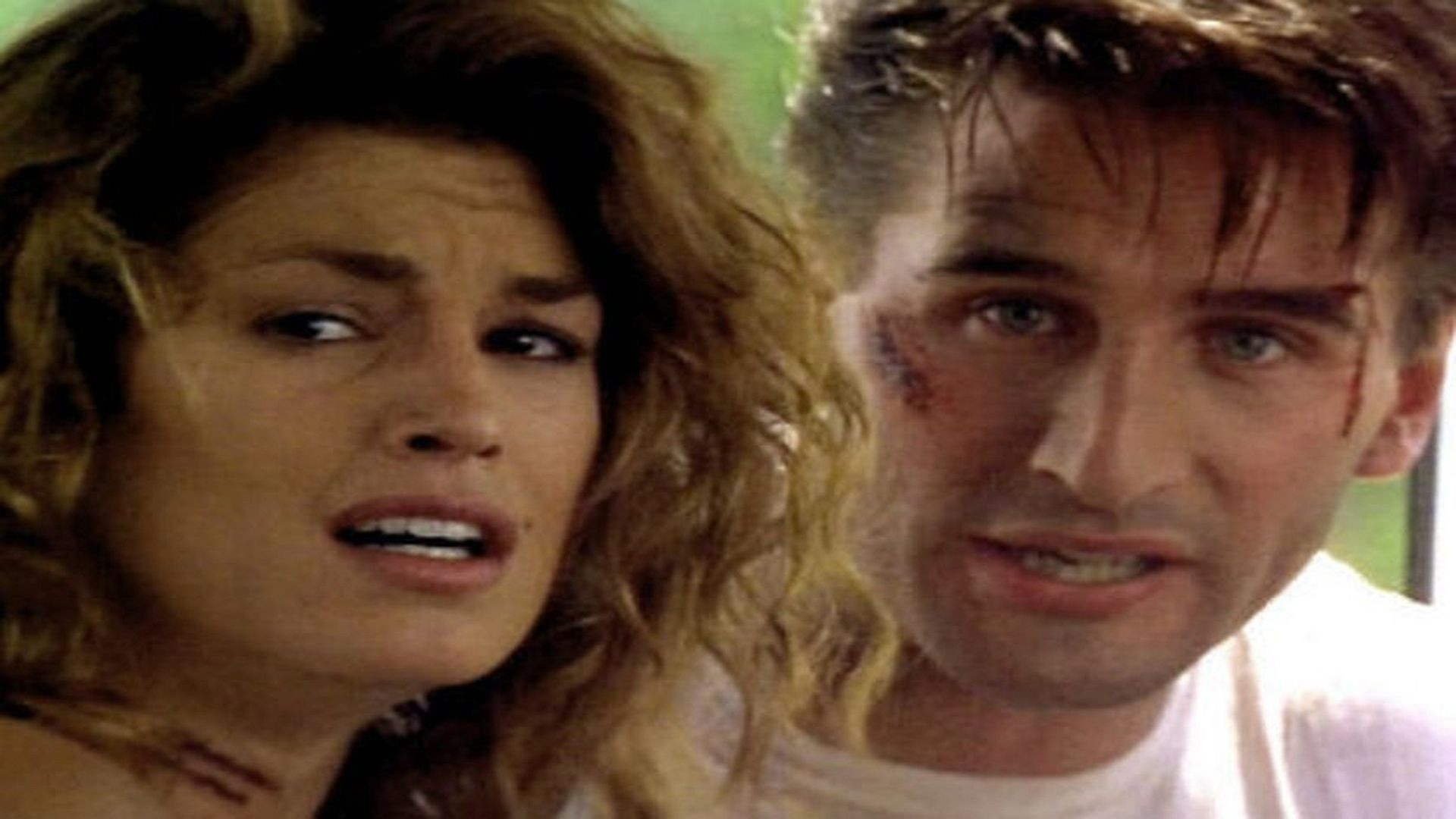I'm Rerunning this piece on 1995's Fair Game Because Life is Hard and Troubles are Many
1995’s Fair Game is a film that loomed large in my imagination as a teenager for whom the day the Sports Illustrated Swimsuit Edition hit the newsstands was Christmas, New Year’s Eve, the Fourth of July and a non-shitty birthday all rolled into one, only better because furious masturbation was involved. This may seem strange to younger readers, but in a pre-internet era, people who loved to masturbate had to actively seek out masturbatory fodder. We didn’t have Youporn or Porn Hub or the entire internet like you perverts have today.
In a pre-internet era, the Sports Illustrated Swimsuit Issue was the best of the best. It was T&A with class and prestige, a gorgeously photographed layout that, in a nice bonus, you could masturbate vigorously to. The Sports Illustrated Swimsuit Issue catapulted women like Crawford to super-stardom. The models in the issue were the creme de le creme, sex symbols like Christie Brinkley, Elle McPherson, and Stephanie Seymour, but Crawford was the queen. She was the preeminent sex symbol of her generation.
People enjoyed looking at Cindy Crawford on billboards, in magazines, and on talk shows and television commercials. Super-producer Joel Silver consequently predicted audiences would enjoy ogling her on a big screen as well. So even though Crawford was not an actress, and had no ambitions to act, she nevertheless ended up with her name above the title in the flop thriller Fair Game, which is based on the same Paula Gosling-written source novel as Sylvester Stallone’s Cobra despite looking and feeling almost nothing like the Reagan-era masterpiece of unhinged pulp.
Silver is an idea man, a big, tacky, super-commercial idea man. He had a very big, even revolutionary idea for Fair Game. This would be no ordinary movie. No, this movie would have something that would set it apart from all other movies: it would co-star a very sexy woman. Like, ridiculously sexy. Unbelievably sexy. Sexiest woman alive-contender sexy.
That would go on a long way towards differentiating Fair Game from the rest of the pack. I mean, how many movies are blessed to co-star extremely attractive human beings, other than pretty much every movie, ever? Even the motion picture Sausage Party, which was both a literal and figurative sausage party, boasted the participation of world-class sexy lady Salma Hayek, whose presence here as Baldwin’s sassy cartoon of an enraged ex-girlfriend makes Crawford’s beauty seem less unique and impressive by comparison.
Crawford’s sensuality is pretty much Fair Game’s sole selling point. Finally, audiences were being given an opportunity to ogle the supermodel in a heavily sexualized setting, something they otherwise could only do pretty much any time Crawford appeared anywhere.
Fair Game relentlessly objectifies Crawford, beginning with an opening sequence that features her running along the beach in silhouette wearing very little. The characters here ogle and leer and stumble all over themselves, most embarrassingly during a wacky comic vignette where, late in the film, the supermodel uses the nuclear-force power of her sexuality to overpower a computer nerd who stammers nervously about he was just “fiddling with his joystick” (i.e masturbating vigorously, or, I suppose, literally just goofing around with a piece of computer equipment) when she showed up to blow his mind.
Name a more iconic duo!
Yet despite the myriad ways the movie reduces its co-lead to a sex object, Crawford’s character is never anything other than just another beautiful woman in a medium filled with women as gorgeous as Crawford who can also act. Whatever magic Crawford possesses as a print model, and she really is the best of the best, does not translate to the big screen. The unflinching movie camera acted as the Super-Model’s Kryptonite, robbing her of her charisma and confidence and exposing her shortcomings as an entertainer who is riveting on a cakewalk or in a magazine but becomes deeply uninteresting every time she opens her mouth.
Fair Game betrays its star at every turn, first and foremost by hilariously miscasting her in the thankless role of family law attorney Kate McQuean, who unwittingly becomes the target of vicious international criminals led by Steven Berkoff and Miguel Sandoval over the course of handling acrimonious divorce proceedings.
The film and the filmmakers seem very impressed that Kate is a badass warrior of the law who says legal-sounding things like, “Listen, Hollebach, the law of the sea is simple and federal! I don’t care if you hid the registry of this vessel in Panama or Podunk. I want the title signed over to my client in 48 hours or you’re going to end up in a federal prison so deep that by the time you get out, you’re going to need a walker to chase ambulance!s”, which the movie seems to see as very impressive legalese but doesn’t make sense initially, and makes less sense the more you think about it.
Is she threatening to send Hollebach (a sleazy lawyer played by Dan Hedaya) to a fabled prison so deep its bowels stretch to the very center of the earth, to our planet’s core, and it would take years just to get all the way up to the surface, even after being released? It would make more sense if she said “You’re going to end up in a federal prison for so long that by the time you get out, you’re going to need a walker to chase ambulances” but maybe the director felt the vacant, monotone delivery Crawford brought to those tortured lines couldn’t be improved upon so he kept the flub in.
Fair Game can’t stop nudging the audience in the ribs, as if to say, “Look at how smart this babe is! A real legal eagle, this one!” and also, “Get a load of that ass! Get a load of those tits! Boy, she sure can fill out a dirty tank top! Hachi Machi!”
Remarkably, both appeals fall hopelessly flat. It’s not terribly surprising that the neophyte non-actor and full-time professional attractive human being isn’t convincing as a tough lawyer trying to survive a harrowing gauntlet of assignation attempts. What’s surprising is that Fair Game can’t even objectify Crawford effectively.
Fair Game can’t hope to match Cobra for nihilistic, Fascist-leaning super-action so it unwisely decides to really double down on the painful wisecracks and one-liners. A good joke in a movie is effortless, organic, immensely, immediately pleasurable. Bad jokes call attention to themselves. They hinder momentum. They bring comedies to a screaming halt.
I’m talking about hypnotically terrible wisecracks like, “When you work my shift, it’s like the toilet: you’re not finished until the paperwork is done” which the perpetually game Christopher MacDonald tries to deliver as naturally as possible in a three minute turn as Baldwin’s mustachioed superior.
The “not finished until the paperwork is done” line doesn’t just force audiences to travel a long, long road for the flimsiest of payoffs. No, the movie makes audiences run the length of a double marathon and, at the very end of their enormous, wasted labor, they’re “rewarded” with a joke that is literally shit, that trades on the idea that for a cranky cop, having to fill out bullshit paperwork is akin to using toilet paper to wipe feces from his anus.
I enjoyed Fair Game a lot more than I had anticipated not because it’s surprisingly good but rather because it is spectacularly bad and inept in a way that has aged in a wonderfully weird, warped, embarrassing way. I did not remember, for example, that Fair Game is not just the movie that finally gave Americans an opportunity to ogle Cindy Crawford: no, it also semi-furtively belongs to a wonderfully misguided 1990s-centric subgenre I like to call the Computer Magic Thriller.
The Computer Magic Thriller took advantage of the general public’s lack of information and knowledge about computers in a pre-internet, pre-social media era to depict computers as not just powerful pieces of technology but as magical entities that can literally do anything, from give birth to a litter of Golden Retriever puppies to sending a nuclear missile into the sun and everything in between.
In Fair Game, for example, we’re informed that the man with the Magic Computer is so powerful that he “reach into your living room and pick your nose for you.” This being a very dumb and very literal movie, I was hoping that this was setting up a scene where a computer’s icy digital reach somehow extends to Kate’s nose, where it could wipe away some mucus without her even noticing, but frustratingly enough, it appears they’re speaking figuratively and hyperbolically.
My favorite character in Fair Game is the adorable extra playing an employee of a pizza place where Kate has an account, who delivers the hopefully improvised line, “How does she eat so much and stay so skinny?”, implying a relationship between his character and the film’s heroine the movie understandably has no interest in developing any further, or at all.
Cobra legendarily featured weird, unforgettable pizza-based character business in the form of hero Cobra slicing his pizza with scissors for reasons known only to him. Not to be outdone, Fair Game has multiple pizza-themed wisecracks, not unlike the poorly received 1991 Bill Maher vehicle Pizza Man.
When a real pizza man tries to get a henchman to move his car by hollering, “Move your car! My pizzas are getting cold!” the henchman responds by blowing him away while quipping, “Da! And so are you!”
This is another line that makes less sense the more you think about it. Is the killer saying that the pizza delivery man’s body will be cold as its life force leaves it and rigor mortis sets in? I suppose that’s true but it’s a real stretch and an instance of adding poorly worded insult to fatal injury.
The movie’s appetite for pizza-based wordplay is still somehow not satiated. A cop helping protect Kate grouses to a killer pretending to be a pizza delivery man, “If this were Domino’s, I’d get a discount!”, to which the killer grimly wisecracks while killing him, “If this were Domino’s, you’d still be alive!”
My second favorite character is here the dude wielding the Magical Computer. The movie works up a feverish sweat trying to get us to buy William Baldwin as a tough, freakishly effective cop and Cindy Crawford as a tough, gutsy lawyer with a mind for law and a bod for sin, then completely undercuts those attempts by having the Magical Computer Man repeatedly and correctly deride our heroes as morons for continually using their credit cards while on the lam, giving away their location at every turn.
The movie’s crazed reverence for computers and their abilities reaches a climax when Baldwin, in a true indication of his genius as a crime-solver, realizes that the reason the fake IDs created by criminals were so convincing and effective is because they were done with a computer. This consequently gives the cyber-villains a huge advantage over the cops, who I imagine can only dream of a day when they’ll finally have access to something as powerful and game-changing as a computer.
Ah, but there is more to Fair Game than magical computers and pizza-based wordplay. There’s also the movie’s money shot, an extended sex scene on a train that goes on for so long and is so central to the movie’s grubby, prurient appeal that even a henchman tasked with killing Kate pauses to get a really good glimpse of the lawyer’s naked breasts.
Fair Game exists pretty much solely for that sex scene and the T&A leading up to it but as climaxes go, that proves predictably anti-climactic.
I enjoyed Fair Game as a brisk, 85-minute-long exercise in unintentional self-parody from Joel Silver, but this could never be mistaken for anything other than a very, very bad movie from some singularly inept players.
Cindy Crawford, unsurprisingly, never starred in another movie ever again. This was the beginning and the end. William Baldwin’s days of top-lining theatrically released motion pictures were similarly drawing to a close and while Joel Silver would go on to produce mega-movies like The Matrix, director Andrew Sipes, whose resume up to that point consisted solely of writing credits on action shows like Spenser: For Hire and The Equalizer, would never go on to direct in television or film.
That seems appropriate. Fair Game proved a career-ender for its miscast female lead and its director alike, but as widely reviled dead ends go, it’s a whole lot of fun, albeit for reasons its creators did not envision. They made a hokey action movie fortified with over-written wisecracks and convoluted, confusing one-liners where every single laugh is nevertheless unintentional.
Did you enjoy this article? Then consider becoming a patron here
AND you can buy my books, signed, from me, at the site’s shop here











